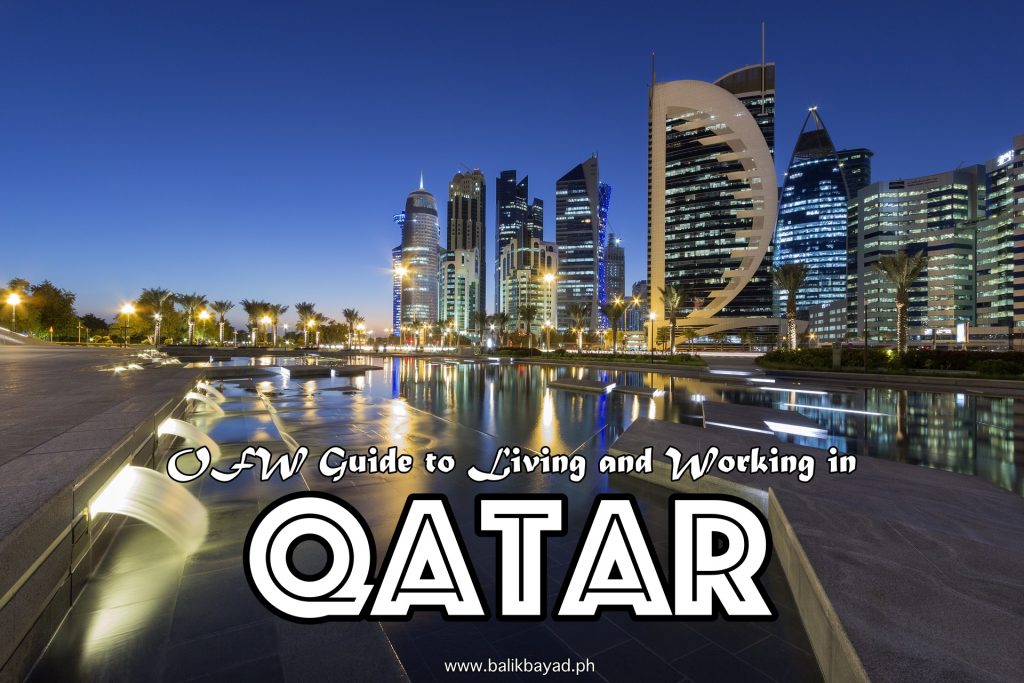 According to the 2015 data released by the Philippines Statistics Authority or PSA, Qatar is the fourth biggest destination of OFWs in the Middle East after Saudi Arabia, UAE, and Kuwait.
According to the 2015 data released by the Philippines Statistics Authority or PSA, Qatar is the fourth biggest destination of OFWs in the Middle East after Saudi Arabia, UAE, and Kuwait.
Consequently, as of January 2017, Qatar-based journalist Priya DSouza reported that there are 260,000 Filipinos living and working in Qatar, thereby making the Filipino community the fourth biggest group of foreign workers living in the country.
You might ask why. It turns out that there is a higher demand for Filipino workers in construction in preparation for Qatar’s hosting of the 2022 FIFA World Cup. Qatar is also among the top destinations for household service workers and healthcare professionals. Teachers are also in demand, thanks to the Qatari government’s expansion plans and high demand for schools and teaching professionals.
Given these facts, what can you expect from Qatar?
Culture
Qatar is a Muslim country, which means its main religion is Islam. Qu’ran dictates and influences the country’s way of life, which also reflects in their laws.
Although Qatar is in the middle of conservative Saudi Arabia and liberal United Arab Emirates, the country’s new Constitution allows religious freedom, which explains why you can see a Catholic Church, especially in Doha. Nonetheless, there are restrictions imposed for those who are non-Muslims.
Alcohol is also not freely available, although there are areas that do sell such as QDC. Restaurants and members-only clubs allow drinking as long as they have license. If you plan to drink in your place of accommodation, then you can freely do so.
Dressing inappropriately, which includes showing skin, is a big no-no, so make sure you dress similarly like the locals before going out. Wearing abaya is not mandatory, but make sure you cover shoulders, cleavage, midriff, and knees.
Living with the opposite sex is also not allowed UNLESS you two are married.
Kafala System under Qatar Labor Law
Similar to Kuwait, Qatar also follows the Kafala system wherein a foreign workers may only work in the country through a sponsor. A foreign worker may also not leave the country or transfer employers without approval from the sponsored employer. This system is the reason why many household service workers are prone to abuse.
Food
Despite the presence of foreign workers, you won’t see restaurants and food halls offering pork in their menu. You can buy pork and eat it in your place. Still, you will find lots of seafood, either boiled or grilled, sold in the market. When it comes to meat products, you will mostly find lamb in the menu.
Don’t worry because there are Filipino restaurants in Qatar, so you’ll always have a taste of home while you’re working there.
Weather
Similar to other countries in the Arab Peninsula, the weather in Qatar is extreme. During summer (May to September), temperature could rise up to 53 degrees Celsius. On the other hand, the weather during winter, which is from November to May, could fall as low as five degrees Celsius.
Rainfall is scarce and flooding is not an issue.
Cost of Living
Don’t be too excited on your salary. Despite earning in dollars, the cost of living in Qatar is high. Most goods sold are imported, which means expensive, and you will find shopping malls that sell everything you need in one place. If you’re not too careful in handling your money, you might end up spending your entire monthly salary.
Check the latest job openings in Qatar and see if there is a position you can apply in. Give it a try and who knows, your future starts here. If you got lucky, you can rise in ranks and be able to bring your family there.
